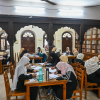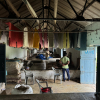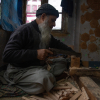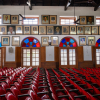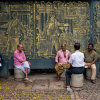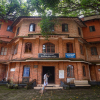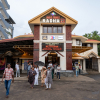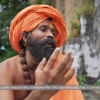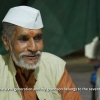I am Dr Johnson Jament from the fishing village of Poonthura (in Thiruvananthapuram). I did my PhD in Education in the University of Northampton. Presently I am working as a lecturer in the University of Northampton’s MA programme in India. Also I do a lot of education development activities in Trivandrum and other parts of India. Trivandrum’s coastal community or the Mukkuva community is one of the traditional indigenous communities in India. They have a unique culture, language, knowledge and value systems. In Kerala, the education provided is common to all people. The individuality of the community is not recognized. So education, instead of empowering the people, has become a sort of marginalization tool, not recognizing the cultural resources, the language, the traditional values or the philosophy of the coastal community. These aspects never come into the educational context in Kerala. Due to this the coastal community feel very negative about themselves. They feel that there is something wrong with them and that they are not civilized people, and hence are not able to achieve much. And also they feel that they are born to fail. This stigmatization of coastal identity has to be changed. Their cultural and traditional resources should be recognized. Those resources should be part of the system. When educationists prepare texts for the curriculum they should include coastal communities’ traditional resources, their cultural practices and language. The teachers should be trained to recognize the diversities of the community and address them. If such a system can address the above issues, I think the coastal community would become more empowered. More liberation can happen within it. Currently it is not happening. The modern education system is not considering their capabilities. The coastal communities are capable of a lot of things. Now what is happening is that real life and the curriculum are different. So children from the coastal community do not feel that this is their curriculum, or that it is about them or for them. That is why when you compare the education results, you will see that the coastal community has always performed below average. I feel there are no role models in the community to emulate. No education system has addressed this issue till now.
The Kerala government opened fisheries schools in 1960s. The fisheries schools were established to see to it that coastal culture was recognized and their traditional capabilities were promoted. That was the intention of implementing fisheries schools in the coastal area. What happened was that there was only one related subject in the curriculum—Fisheries Science. The rest were general subjects. What I feel is that sometimes forced assimilation or an unwanted assimilation is being promoted. When the curriculum is not adapted to the local context, it becomes irrelevant to their daily lives. Even though the fisheries schools tried to give education to the coastal children along with many facilities like hostels, not many reforms happened in the training of teachers or the curriculum or the textbooks. That is why the fisheries schools are finding it difficult to perform very well. They can be used as a good means for the fishing communities to identify local issues, to develop textbooks relevant to the local context and to train teachers to address local issues. Then more children would be attracted to the schools and the results might be improved. This is why I feel reforms should happen in the fisheries schools in Kerala.


